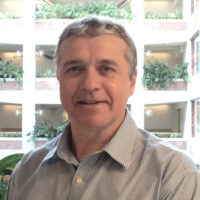
Assistant Biologist
Massachusetts General Hospital
Assistant Professor of Medicine
Harvard Medical School
Contact
Massachusetts General Hospital
Cardiovascular Research Center
149 13th Street, 4.216
Charlestown, MA 02129
617-643-2290
Email
The lab’s research combines mouse genetics, detailed physiologic and hemodynamic measurements, and animal models of human disease, including stroke, atherosclerosis, and diabetes. Dr. Atochin is specifically interested in mechanisms of cerebral blood flow regulation. His current work focuses on the role of Akt-eNOS-cGMP-SMC axis in cerebrovascular dysfunction. He demonstrated that mice that carry specific phosphomymetic mutation in eNOS gene are protected against stroke (Journal of Clinical Investigation, 2007). He also demonstrated that deficiency of cGMP dependent kinase (cGKI) in vascular smooth muscle cells (SMC) impairs vascular reactivity to nitric oxide and is associated with incomplete reperfusion, larger infarct size, and worse neurological damage, indicating that cGKI SMC signaling is protective in ischemic stroke (Journal of Cerebral Blood Flow and Metabolism 2019). The overall unifying theme behind his work is applying in vivo physiology and disease models to genetic models relevant to the nitric oxide pathway, soluble guanylate cyclase, and smooth muscle cells. He has extensive experience with genetically modified mice, measurement of cerebral blood flow and vascular reactivity in mice, and with mouse stroke models. His work is important since it can lead to the development of new approaches to treat cardiovascular and cerebrovascular disease.
Dr. Atochin received his MD at Siberian State Medical University (Tomsk) and PhD at Institute of Evolutionary Physiology and Biochemistry (St.Petersburg) in Russia. He was postdoctoral fellow at the Institute of Environmental Medicine of University of Pennsylvania (Laboratories of Drs. D. Buerk, S. Thom and V. Muzykantov) and at MGH’s CVRC(laboratory of Dr. P. Huang), where he was promoted to Instructor and Assistant Professor.
Research Areas
Cardiac Physiology and Disease
Vascular Biology and Metabolism
Publications
View Publications
